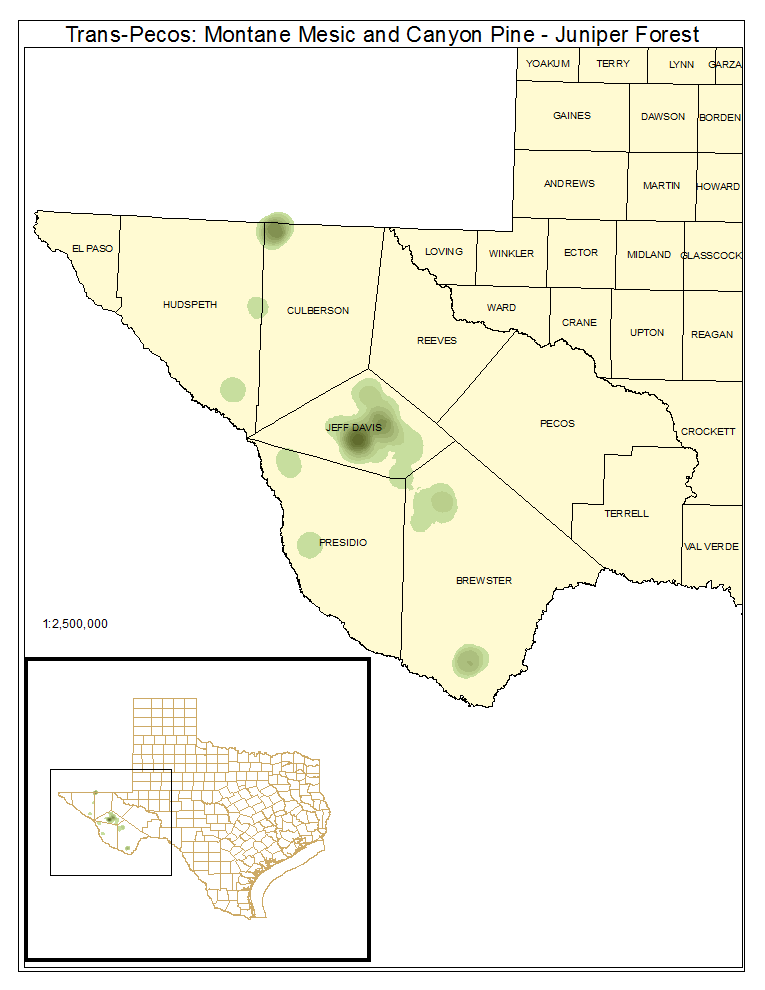Madrean Mesic and Canyon Forest and Woodland
Geology:
Various geological strata of the Trans-Pecos mountains, particularly limestone and igneous formations. The system often occupies local alluvium, both fine and coarse, and sometimes Quaternary alluvium as mapped.
Landform:
Montane canyons and stream terraces.
Soils:
Canyon (Mountain Savannah), Foothill Slope, Draw, Limestone Canyon, Mountain Loam, Limestone Hill & Mountain and Igneous Hill & Mountain Ecological Sites.
Parent Description:
Formerly, this previously undescribed system had components that may have been included in the Madrean Lower Montane Pine-Oak Forest and Woodland, Madrean Upper Montane Conifer-Oak Forest and Woodland, North American Desert Lower Montane Riparian Woodland and Shrubland, or Rocky Mountain Bigtooth Maple Ravine Woodland. These woodlands occur in canyons and along streams, sometimes occupying benches, terraces, and adjacent lower slopes with coarse, rocky substrate. The canopy may be variously dominated by a number of coniferous, broad-leaved evergreen, and deciduous components depending on phytogeography, elevation, and availability of groundwater. Canopy species may include Pseudotsuga menziesii (Douglas-fir, lacking in the Davis Mountains), Pinus ponderosa var. scopulorum (ponderosa pine), Pinus arizonica var. stormiae (Arizona pine, in the Chisos Mountains), Pinus cembroides (Mexican pinyon pine), Pinus edulis (pinyon pine, in the Guadalupe Mountains), Cupressus arizonica (Arizona cypress), Juniperus deppeana (alligator juniper), Juniperus flaccida (weeping juniper, in the Chisos Mountains), Quercus emoryi (Emory oak), Quercus rugosa (netleaf oak), Quercus hypoleucoides (silverleaf oak), Quercus graciliformis (Chisos oak), Quercus gravesii (Chisos red oak), Quercus muehlenbergii (chinkapin oak), and Quercus grisea (gray oak). Species such as Ungnadia speciosa (Mexican buckeye), Acer grandidentatum (bigtooth maple), Fraxinus velutina (velvet ash), Prunus serotina var. virens (southwestern chokecherry), Arbutus xalapensis (Texas madrone), Ostrya knowltonii (western hop-hornbeam, in the Guadalupe Mountains), and/or Ostrya virginiana var. chisosensis (Big Bend hop-hornbeam, in the Chisos Mountains) may be present in more mesic situations, such as perennial water sources. Shrubs that may be present include Salvia regla (mountain sage), Juglans microcarpa (little walnut), Nolina erumpens (foothill nolina), Dasylirion leiophyllum (smooth sotol), Agave havardiana (Havard agave), Agave parryi ssp. neomexicana (New Mexico agave), Mahonia haematocarpa (red barberry), Garrya ovata (eggleaf silktassel), Ceanothus greggii (desert Ceanothus), Crataegus tracyi (mountain hawthorn), Cercocarpus montanus (mountain mahogany), Sambucus nigra ssp. cerulea (blue elderberry), Frangula betulifolia (birchleaf buckthorn), Philadelphus spp. (mockorange), and Vitis arizonica (canyon grape). The herbaceous layer is patchy with species such as Piptochaetium fimbriatum (pinyon ricegrass), Bouteloua curtipendula (sideoats grama), Poa strictiramea (Chisos bluegrass), Muhlenbergia rigida (purple muhly), Muhlenbergia emersleyi (bull muhly), Bothriochloa laguroides ssp. torreyana (silver bluestem), and Schizachyrium scoparium (little bluestem).
Ecological Mapping Systems
Trans-Pecos: Montane Mesic and Canyon Pine / Juniper Forest
Canyon and mesic slope woodlands dominated by coniferous evergreen species of Pinus spp. (pines), Juniperus spp. (junipers), Pseudotsuga menziesii (Douglas-fir), and/or Cupressus arizonica (Arizona cypress).
Distribution Map

Photos

Public Land Occurrence
- Big Bend National Park: US National Park Service
- Davis Mountains State Park: Texas Parks & Wildlife Department
- Fort Davis National Historic Site: US National Park Service
- Guadalupe Mountains National Park: US National Park Service
- Sierra Diablo Wildlife Management Area: Texas Parks & Wildlife Department
Trans-Pecos: Montane Mesic and Canyon Hardwood / Pine / Juniper Forest
Woodlands co-dominated by coniferous evergreen species and broad-leaved evergreen and deciduous hardwoods including Quercus spp. (oaks), Acer grandidentatum (bigtooth maple), and possibly other species.
Distribution Map

Photos

Public Land Occurrence
- Big Bend National Park: US National Park Service
- Black Gap Wildlife Management Area: Texas Parks & Wildlife Department
- Davis Mountains State Park: Texas Parks & Wildlife Department
- Elephant Mountain Wildlife Management Area: Texas Parks & Wildlife Department
- Guadalupe Mountains National Park: US National Park Service
- Sierra Diablo Wildlife Management Area: Texas Parks & Wildlife Department
Trans-Pecos: Montane Mesic and Canyon Hardwood Forest
Forests and woodlands dominated by deciduous hardwoods such as Acer grandidentatum (bigtooth maple), Quercus muehlenbergii (chinkapin oak), Quercus gravesii (Chisos red oak), and Fraxinus velutina (velvet ash). Coniferous evergreen and broad-leaved evergreen are often present in the canopy.
Distribution Map

Photos

Public Land Occurrence
- Big Bend National Park: US National Park Service
- Big Bend Ranch State Park: Texas Parks & Wildlife Department
- Davis Mountains State Park: Texas Parks & Wildlife Department
- Elephant Mountain Wildlife Management Area: Texas Parks & Wildlife Department
- Guadalupe Mountains National Park: US National Park Service
- Sierra Diablo Wildlife Management Area: Texas Parks & Wildlife Department
Trans-Pecos: Montane Mesic and Canyon Evergreen Shrubland
Shrublands often mixed within a woodland or forest matrix and dominated by coniferous evergreen and/or broad-leaved evergreen species, often species represented in the canopy of the evergreen forest and woodland.
Distribution Map

Photos

Public Land Occurrence
- Big Bend National Park: US National Park Service
- Black Gap Wildlife Management Area: Texas Parks & Wildlife Department
- Davis Mountains State Park: Texas Parks & Wildlife Department
- Elephant Mountain Wildlife Management Area: Texas Parks & Wildlife Department
- Guadalupe Mountains National Park: US National Park Service
- Sierra Diablo Wildlife Management Area: Texas Parks & Wildlife Department
Trans-Pecos: Montane Mesic and Canyon Shrubland
Shrublands often mixed within a woodland or forest matrix and dominated by deciduous shrub and small tree species.
Distribution Map

Photos

Public Land Occurrence
- Big Bend National Park: US National Park Service
- Davis Mountains State Park: Texas Parks & Wildlife Department
- Elephant Mountain Wildlife Management Area: Texas Parks & Wildlife Department
- Guadalupe Mountains National Park: US National Park Service
- Sierra Diablo Wildlife Management Area: Texas Parks & Wildlife Department